Lakshmi and Kubera : The Money Gods in Hindu
Introduction
Within the vast fabric of Hindu mythology, two very different archetypes—the demi-god Kubera and the goddess Lakshmi—come to represent prosperity and wealth. Both are connected to material prosperity, yet they teach quite distinct messages and have quite different representations. Examining the subtleties of these legendary people reveals a deep investigation of the nature of riches, how it is acquired, and the way to long-lasting happiness.
Kubera, The Wealth Keeper
The wealth-lord Kubera is frequently shown as a small, obese, and physically abnormal man. Given to him by divine favor, his fortune is evidence of the strength of heavenly favor over human labor. The anecdotes about Kubera illustrate a complicated relationship characterized by showmanship, envy, and an unquenchable need to accumulate.
Expansion via Sacred Order
Kubera received his fortune from the gods, not from his own inventiveness or diligence. This relationship emphasizes a basic difference between wealth that is just given and wealth that is gained by talent and effort. While the later can encourage a reliance on outside forces and a lack of independence, the former frequently results in a deeper sense of empowerment and resilience.
The Weight of Clutter
Instead of bringing him happiness and contentment, Kubera’s fixation with amassing and protecting his money becomes a burden. His demise finally results from his emphasis on accumulating material belongings at the price of developing other facets of life, such relationships, knowledge, and personal development. This warning story emphasizes the need of achieving a balance between the quest of total well-being and monetary wealth.
The Hazards of Presumption
More out of conceit than sincere devotion, Kubera hosts an extravagant feast for the gods out of his conceit and desire to display his wealth. By eating Kubera’s riches, Lord Ganesha steps in to humble the demi-god and teach him of the real meaning of wealth.

Goddess of Wealth and Plenty Lakshmi
The Goddess Lakshmi stands for a more comprehensive and multidimensional concept of wealth than Kubera. Her eight manifestations—known as the Ashta Lakshmi—include not just monetary wealth but also a profusion of knowledge, bravery, and spiritual fulfillment.
The Complexity of Riches
Adhi Lakshmi, Dhana Lakshmi, Dhairya Lakshmi, Dhanya Lakshmi, Gaja Lakshmi, Santana Lakshmi, Vidya Lakshmi, and Vijaya Lakshmi are the eight manifestations of Lakshmi that represent the many facets of riches that go beyond simple material abundance. This broad perspective promotes a balanced way of living in which financial success is only one aspect of a happy life.
Importance of Humility
Though she is the Goddess of Wealth, Lakshmi is seen as submissively bowing herself to Lord Vishnu’s lotus feet. This modest manner contrasts sharply with Kubera’s conceit and emphasizes the need of always feeling grateful and reverent even in the face of plenty.
The Influence of Inflow
Many times, Lakshmi is shown as a shower of gold coins, signifying the generative and endless character of her favors. This is in contrast to Kubera’s wealth of static assets, which while priceless, do not by nature provide continuous revenue or maintain wealth. The lesson here is to emphasize long-term cashflow development above asset accumulation.
The Kubera and Lakshmi Lessons
There are many more insights regarding the nature of real success and the way to material, personal, and spiritual fulfillment in the opposing stories of Lakshmi and Kubera.

Making Money vs. Saving Money
Kubera’s story emphasizes how wealth that is obtained by divine favor or good fortune is limited in its ability to weather hardship. Nevertheless, Lakshmi’s fortune is based on her capacity to create, maintain, and replenish plenty, which is consistent with the ideas of value creation and entrepreneurship.
Mindset of Abundance
With her multifaceted riches and modest manner, Lakshmi exemplifies an abundant mentality that emphasizes the generating and restorative potential of money. This kind of thinking is very different from the conceit and hoarding motivated by shortage that finally brought Kubera down.
Growing Wholesome Wealth
With their many incarnations, the Ashta Lakshmi stress the need of seeking a comprehensive approach to wealth that includes not just worldly success but also spiritual fulfillment, personal development, and the welfare of one’s community. This viewpoint promotes a moderation and purposeful quest of plenty.
Using the Kubera and Lakshmi Lessons
Lessons from Lakshmi and Kubera’s stories are highly applicable as we negotiate the contemporary wealth and financial management scene.
Taking Up An Entrepreneurial Mentality
Like Lakshmi, we can develop an entrepreneurial attitude that appreciates talent, creativity, and the production of value. Using this method frees people from depending just on luck or other forces to become independent and resilient in the face of hardship.
Developing Long-Term Cashflow
Leaning on Lakshmi’s depiction of wealth as a renewable resource, we can give the creation of sustainable cashflow precedence above the acquisition of assets. This change in emphasis promotes careful money management, diversification, and looking for investments that will provide continuous income streams.
Seeking Wholesome Wealth
Accepting the complex character of Lakshmi’s fortune, we can work toward a comprehensive definition of prosperity that includes not only material wealth but also intellectual, spiritual, and personal development. More purpose, happiness, and long-lasting well-being can result from this balanced viewpoint.
Conclusion
The opposing archetypes of Lakshmi and Kubera provide a deep investigation of the real meaning of riches and the way to long-lasting success. Knowing the principles woven throughout these legendary stories can help us to develop a more complete, robust, and satisfying approach to money management and personal development. The knowledge of Lakshmi and Kubera can be a lighthouse as we negotiate the complexity of the contemporary world, enabling us to produce, maintain, and celebrate the many kinds of riches that enhance our lives.







